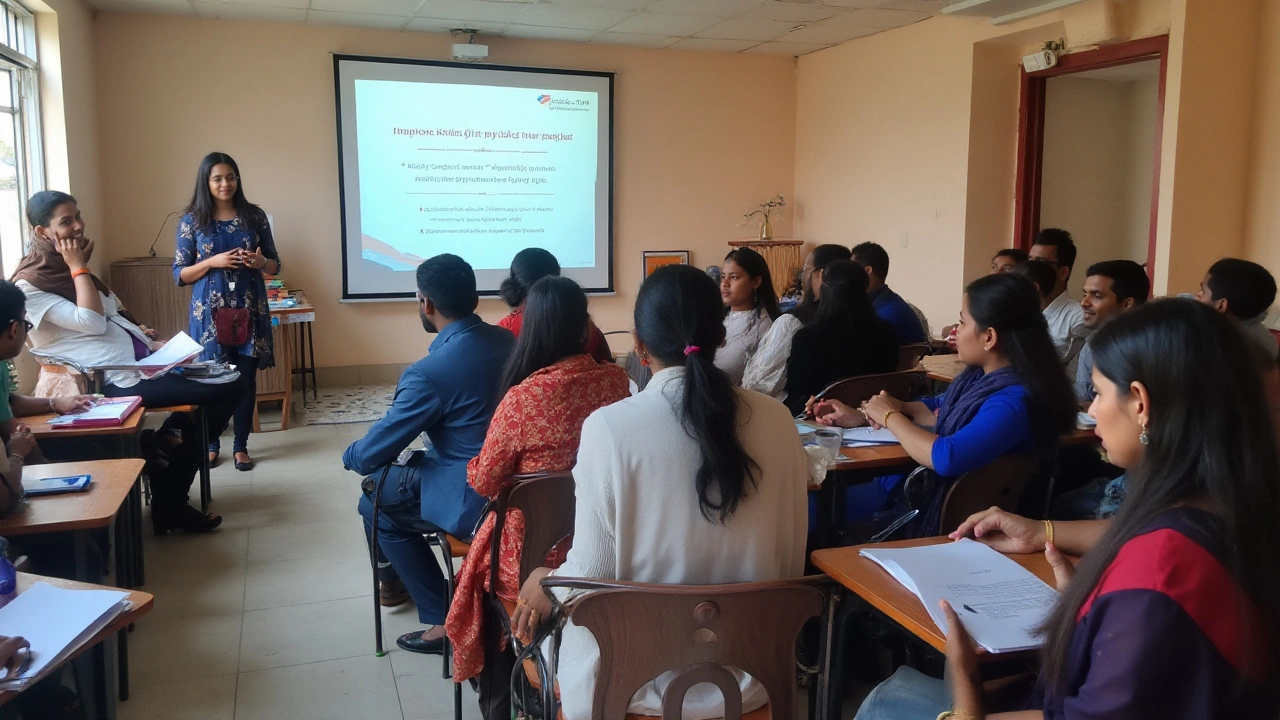In the quest for a secure and impactful career, government jobs stand as a beacon of opportunity for many. The allure is clear: stable employment, attractive benefits, and the chance to make a difference in public service. However, navigating the road to such jobs can seem daunting without the right guidance.
For those seeking to unravel the intricacies of government job applications, this article aims to shed light on key strategies and realities. Whether you're drawn by the promise of stability or the desire to contribute to society, understanding the market and enhancing your skills can be pivotal. Join us as we explore the avenues that could lead you to a rewarding career in the public sector.
- Understanding the Government Job Market
- Application Processes and Common Challenges
- Examination Preparation Tips and Strategies
- Importance of Skills and Continuous Learning
- Insights from Successful Candidates
Understanding the Government Job Market
The government job market is a complex network of opportunities that can be both enticing and challenging to navigate. In the current climate, the demand for these jobs remains high, prompting aspiring candidates to dive headlong into a sea of forms, exams, and interviews. It's a world where competition is fierce, requiring a keen understanding of how the system works. Each year, tens of thousands of positions open up across various sectors, ranging from administrative roles to specialized positions in healthcare, engineering, and law enforcement. The need for such jobs isn't just confined to capital cities or major metros; it extends to rural areas and smaller towns, presenting opportunities across a broad spectrum of geographical locations.
Many people are drawn to government jobs for a plethora of reasons. Chief among them is stability, an aspect of public service employment that has become even more pronounced in recent times. The combination of a respectable salary and generous benefits, which often includes healthcare, pension plans, and job security, makes these positions particularly appealing. However, the path to securing such employment demands diligence and significant preparation. Beyond the visible elements of job postings and interviews, understanding the political and administrative nuances that govern these roles is critical. For some, it may even require familiarity with specific bureaucratic processes or knowledge of civil service examinations. A successful candidate often needs more than just academic qualifications—they need timing, strategy, and an understanding of where they fit into the ecosystem of government employment.
According to a recent statement by a prominent HR official,
"Preparing for a government job is akin to preparing for a marathon. While qualifications get you to the starting line, it's the preparation that helps you cross the finish line."This underscores the importance of understanding the landscape. Various governmental sectors release annual hiring reports, which are invaluable resources for identifying trends in employment opportunities. For instance, a sharp rise has been observed in the demand for digital skillsets, influenced by the wave of digital transformation sweeping across public services. Being in tune with these trends can give candidates an edge. Exploring such patterns can sometimes reveal that vacancies in lesser-known fields offer rich opportunities for fast-tracked career growth.
In terms of statistics, it's important to note that competition can vary widely depending on the region and type of position. A table of applicant-to-position ratios shows striking contrasts:
| Sector | Applicants per Position |
|---|---|
| Administrative | 50:1 |
| Technical | 30:1 |
| Healthcare | 20:1 |
Application Processes and Common Challenges
Embarking on the journey to secure a government job requires navigating a labyrinthine application process that can often seem daunting. The first step involves a thorough understanding of the diverse entry points and recruitment exams typical in the public sector. Depending on the job level and specialization, candidates might need to navigate through examinations conducted at the state or national level, each with its own distinct pattern and eligibility criteria. Being well-versed with the specifics of these exams—be it the UPSC for civil services or SSC examinations for staff positions—can offer a crucial edge in preparation. With myriad notifications and varying deadlines, staying organized and informed is paramount. One should regularly visit official government websites and employ job portals to track examination announcements and results.
The application forms themselves often demand meticulous attention. They typically require details ranging from educational backgrounds to personal identifications. A common challenge for many applicants is ensuring that all submitted documents corroborate the information stated in their applications. Discrepancies or incomplete applications can easily result in disqualification due to the high competition levels. Indeed, the Public Service Commission often experiences millions of applicants for just a few thousand positions, meaning attention to detail can drastically impact success. As one seasoned bureaucrat once remarked,
“Success in a government examination is as much about strategy and precision as it is about intellect.”
An often-underestimated aspect of the application process is understanding the reservation system inherent in India’s public sector jobs. Various categories like SC/ST, OBC, and economically weaker sections (EWS) carry specific quotas, shaping the dynamics of the selection process. Applicants from reserved categories typically compete within set quotas, while general category candidates vie across the remaining positions. Therefore, underestimating the implications of this reservation policy could lead to strategic missteps. One should be well-informed about the quota limits and any certificates required to leverage these categories within their applications.
Another challenge in this process is the sheer volume of knowledge required for competitive exams. These examinations not only test scholastic achievements but also gauge reasoning, quantitative aptitude, and general awareness. A multi-faceted preparation is thus crucial, one that involves studying diverse subjects over an extended period. Additionally, investing in learning aids such as mock tests and previous year papers can significantly enhance readiness. Yet, this rigorous preparation can strain both time and resources, making the journey arduous if not carefully managed.
According to recent statistics, only a marginal percentage of applicants qualify for government roles, reflecting the intense competition and high benchmarks. This makes resilience and perseverance key traits for aspirants. One must brace for potential setbacks and continue refining their skills and strategies. Building a community of fellow aspirants can sometimes offer emotional support and access to shared resources like coaching notes or study materials, which prove invaluable during this challenging phase.

Examination Preparation Tips and Strategies
Securing a government job requires diligent preparation, with exams often being the most significant hurdle in this journey. The competition for these coveted roles is fierce, with applicants numbering in the thousands. Yet, cracking these exams is entirely possible with the right strategies. A solid study plan is the foundation of success. Begin by thoroughly understanding the structure and content of the examination you're attempting. Most government exams, such as the UPSC or SSC, follow a multi-tier structure, consisting of preliminary and main exams followed by interviews. Breaking down the syllabus into manageable chunks and creating a timetable that reflects this segmentation can help cover all necessary topics effectively.
The importance of regular practice cannot be overemphasized. Consider solving previous years' question papers and taking mock tests routinely. This practice not only tests your knowledge but also improves your time management skills—holding great importance on the exam day. Time and again, successful candidates stress the significance of practicing with a timer to simulate actual exam conditions, which aids in boosting speed and precision.
Skill enhancement is another crucial aspect. Government jobs often demand a sound understanding of general awareness, quantitative aptitude, and reasoning. Thus, it becomes essential to keep updated with current events and hone numerical skills. Online platforms and e-learning websites offer numerous resources to enhance these skills. Referring to standard textbooks and setting daily reading goals can build a strong foundation in these subjects.
"Success isn't always about greatness. It's about consistency. Consistent, hard work gains success." – Dwayne Johnson
Success stories vary, but a recurring theme is efficient time utilization. The best way to do this is by identifying your strengths and weaknesses early on. This analysis can influence your study plan, enabling you to allocate more time to weaker areas without neglecting your stronger ones. Don't underestimate the value of taking breaks and ensuring your routine has enough flexibility to accommodate unforeseen circumstances or the occasional need for rest.
It's also worth considering the potential benefits of joining a study group or enrolling in a coaching class. Both can provide structure and motivation, offering a platform to discuss ideas and clarify doubts. Moreover, these provide access to additional materials and expertise, which can prove incredibly beneficial, especially in understanding complex concepts where self-study might fall short.
One lesser-known but impactful strategy is interview preparation alongside written exams. Begin researching common interview questions relevant to the job and practice articulating well-rounded responses. Government jobs often value candidates who not only excel academically but also convey their thoughts confidently. It's crucial to stay updated on current national and international issues, as these often form the basis of interview questions.
Strategizing your approach to exam preparation and maintaining balance is key to bridging the gap between aspiration and achievement. Remember, consistent efforts coupled with strategic planning have been the pathway to success for many. Being well-prepared not only enhances your knowledge but also strengthens the resolve needed to embark on a fulfilling career in the public sector.
Importance of Skills and Continuous Learning
Embarking on a path towards a government job requires more than just academic credentials; it demands a commitment to continuous learning and the enhancement of relevant skills. In an ever-evolving job market, the skills you possess could make or break your chances of securing a stable role in the public sector. Employers are keenly interested in candidates who exhibit both technical proficiency and soft skills, as these are indicative of a person's potential to excel and adapt in a government job. For instance, proficiency in information technology stands as a valuable asset as digital transformation sweeps through governmental operations around the world, reshaping how services are delivered to the public.
The need for skills extends beyond technical expertise. Communication, problem-solving, and leadership skills play significant roles in your employability. A recent survey found that 72% of public sector leaders value communication skills higher than any other attribute. As we navigate through tasks that require collaboration and negotiation, the ability to express ideas clearly becomes indispensable. Decision-making, another critical aspect, is often bolstered by a well-crafted problem-solving strategy. Public sector positions frequently require analytical thinking to identify solutions for complex scenarios that lack precedent.
Adapting to the changes in job demands through continuous learning is not just an advantage but a necessity. Courses, workshops, and online learning platforms can serve as stepping stones, making you more competitive. Many government agencies offer employee development programs designed to refine essential skills, providing both a refresher and advanced opportunities for growth. As technology becomes deeply integrated into public service, staying ahead with the latest technological advancements is vital. It's crucial to cultivate a habit of lifelong learning, as stated by former President of the United States, Barack Obama:
"The future belongs to young people with an education and the imagination to create."
Incorporating new abilities into your professional repertoire can be the differentiating factor in job applications. According to a study published by the World Economic Forum, new roles in the public sector that underlying skills such as data literacy, critical thinking, and creativity are among the 10 sought-after competencies. Training yourself in these areas not only strengthens your application but also prepares you for the dynamic nature of government jobs. As recruitment competitions grow fierce, the candidates who stand out are often those demonstrating a proactive approach to learning, showcasing their readiness for the challenges that lie ahead.
To effectively build on your skill set, consider setting personalized goals for professional development. Begin by identifying the skills that need improvement and seek opportunities to practice them regularly. Networking with peers and participating in professional groups related to government employment can provide fresh perspectives and valuable connections. Peer learning, through study groups or mentorship programs, offers unique insights and can foster a culture of collaboration and innovation. In exploring new learning avenues, you're not only preparing for the present landscape but also positioning yourself for the future. Embrace the notion that skills development is an ongoing journey, an indispensable part of securing and thriving in a government job.

Insights from Successful Candidates
Securing a position in the competitive realm of government jobs is no small feat. Candidates who have navigated this journey often hold a treasure trove of wisdom, offering invaluable insights into their experiences. It's a known fact that persistence, a well-planned strategy, and resilience play crucial roles in their success. Many emphasize the importance of understanding the specific requirements of each role and tailoring their preparation accordingly. This means delving into the particular exams associated with the desired positions and dedicating substantial effort to mastering them.
Moreover, successful candidates often highlight the significance of honing relevant skills. This involves not just academic knowledge, but also attributes like problem-solving, time management, and effective communication. In preparing for interviews, understanding the organizational values and current projects of the public entity can set apart a potential hire. Networking with current employees and understanding the internal dynamics is also frequently cited as a strategic advantage. It's a commitment not only to personal development but also to embodying the ethos of public service.
Employment tips shared by those who have triumphed often include advice on mental preparation as well. Tackling the rigorous tests and interviews requires a strong mental fortitude and an unyielding focus. Embracing failure as a step towards learning and improvement is a common thread in their narratives. For instance, candidate workshops and mock interviews are invaluable, offering a rehearsal ground that caters both to the development of hard skills and the building of confidence. The community of aspiring candidates serves as a support network, providing encouragement and shared resources.
It's worth noting that adapting to the evolving demands of the public sector is essential. The skills that were relevant a decade ago might not hold the same value today, and thus, continuous learning is crucial. Many we've interviewed advise keeping abreast with new regulations, technological advancements, and administrative reforms. This dynamic approach ensures not just entry, but also a fulfilling journey through the ranks of public service. As emphasized by one prominent analyst, "The key to thriving in government roles is a genuine commitment to adaptation and learning."
In some cases, specific data can illuminate just how these strategies are applied in reality. Consider that in recent surveys of public sector applicants, over 60% reported that attending workshops substantially improved their knowledge of the role, while 55% found networking to yield unexpected opportunities. Ultimately, it's clear that a multifaceted approach, knit together with dedication and adaptability, forms the cornerstone of success in securing a reliable and impactful position in government employment.
